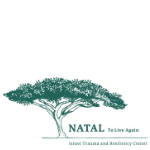Taken from Rami’s blog 24/11/20
*Trigger Warning: War, PTSD, *
It is not easy being the child of a post-traumatic parent. It’s also not easy to be a father to your children when you suffer from post-trauma. I was blessed with 3 boys, and from the moment of their birth the dilemma of how I tell them arises. How am I meant to share my experiences of war? You want to tell them because it’s important that they recognize these aspects of who their father is, however at the same time there is the parental instinct to protect. Why expose them to these atrocities?
Who could have known that a television series would provide a rare moment of father-son connection with my 3rd son, based on my experiences of war.
It happened like this:
Yesterday the 5th episode of Valley of Tears was broadcast. We are midway through the series, and it was the first time that I watched the show as it went on air and not at a later time of my choosing.
I was able to digest the previous episodes quite easily. To me, the uniqueness of the series is its ability to authentically convey the individual experiences of a simple soldier during the war.It’s a rare thing to see an Israeli war experience based on real events, unfold on film or TV in Hebrew. This is the sentiment that connects me to the series. At least that’s what I had thought until episode 5.
In the middle of the 5th episode (I’ll try not to give away any spoilers for those who haven’t yet seen it) is a scene featuring Yoav (Aviv Alush), a Golani officer who lost almost all of his soldiers in an encounter with the Syrians, and Avinoam (Shara Tabush) a somewhat eccentric and genius intelligence officer who doesn’t belong in the battlefield. Instead of a weapon Avinoam carries a hedgehog as a pet. The two march alone in a quiet field, immersed in intimate conversation about their personal lives, which shows them to be two completely different people whom only the battlefield could bring together.
They reach an open field. At this point my heart begins to race. I don’t have access to the script, nor did I receive information from the production, but I know exactly what is going to happen (and it does happen later).
Two minutes into the start of the broadcast, Eli, my son, joins me on the couch next to my third and youngest son, Assaf. I rarely sit with my kids to watch TV – all the more so with war-related content.
“Another war, Dad? You haven’t had enough yet? Haven’t you seen this 674 times already?” Such remarks are hurled at me frequently.
But yesterday it was different. He connected, and when Avinoam and Yoav stopped suddenly in the middle of an open field I burst out loudly – partly to myself and partly as a protective warning to Assaf – “they are entering a minefield.”
As part of my military training, I took part in a training course in combat engineering that included, amongst other things, preparation of explosives, trials with explosives, mine clearance, breaking down obstacles, blowing up buildings, etc. In my reserve duty, I was one of the founders of the Nahal Brigade’s division “Ha Palhan”.
These skills gave me lots of hours of free time in the minefields. Even before all this goodness in that famous summer of ‘83 in Lebanon, was the summer in which I experienced the tripod of 3 incidents in which my post-trauma sits. One of these incidents is a particularly horrific one that takes place in a minefield (please do not try to imagine it).
With all my ability to speak and write raw and emotionally charged content about combat experiences in Lebanon, and the post-traumatic roller coaster that has accompanied my life ever since, the minefield incident has remained hidden, and has barely seen daylight.
Back to yesterday.
A second after I emit this comment the scene starts taking place in a minefield. At the same time on the sofa in the living room there is a gentle interaction of emotional dismantling between father and son. While watching, the memories of that experience begin to reappear, I can feel the danger of emotional flooding that is imminent, and I can sense that a flashback is approaching, accompanied by an anxiety attack.
Assaf, like an expert, an emotional surgeon, begins to ask matter-of-fact, curious questions. Not about my personal experiences (I’m not sure I told him), but he is trying to understand through the professional eyes of his veteran father what is going on in the show. At some point it becomes a personal conversation that rises above what is happening on the screen. Into the air, my son throws questions about minefields? How to identify them? How do you get out of a minefield? Dad, have you once laid a minefield? Have you ever dismantled / neutralized mines? Is it scary? How do you do that? How did you learn that?
And I cautiously begin to move away from the difficult personal experience and patiently answer his questions from a professional point of view (in exactly the same calm, quiet and confident style that I taught statistics for years. Believe me it’s no less complicated than getting out of a minefield). The conversation with Assaf evokes other emotions, not the difficult sights and feelings that accompanied that difficult experience in that minefield in Lebanon, in the summer of 83, but all the dozens of long hours I spent as a professional trained in dismantling, neutralizing, clearing and laying minefields. I began to feel this strange feeling, the peace of mind that accompanies the experience, regulating my breath. The body and mind restore this strange self-confidence: even though you are in a dangerous and explosive sensitive environment that can kill you quickly if you lose even a split second of concentration, you are calm and confident, very connected, present only here in a minefield, concentrated in the mine in front of you.
While talking to Assaf, and as we are both aware of the complexity of the situation, I enter more and more into a zone of silence, of serenity, mental clarity. I have experienced these states before, on various occasions in my life, including in the middle of a minefield. This mental clarity that I was feeling, has always amazed me, the paradox. This feeling is one of the less commonly discussed sentiments in post-trauma treatment. It is one of the components that makes it so difficult. Alongside the horrors provided by war, of course. It provides you with opportunities to enter the most exposed and extreme places for better or worse, of being human. Places that you can probably only reach in such an environment of extremity.
Some of these places within you that you have reached there have revealed abilities that you cannot recreate in civilian life, the one you have lived ever since. Some haunt you all your life, and some you really miss.
Assaf’s serenity, his sensitive and wise questions felt just like neutralizing a mine in the middle of a minefield. On one hand there is fear (that there will be a terrible flashback here) that the mine you are handling will explode, and on the other hand there is an ability to exercise judgment and calmness based on training and experience, ensuring that this explosive and armed mine below you will not explode, because you know exactly what to do.
It was a delicate interaction between Assaf and I. He’s the self-confident sapper, carefully dismantling mines in the field, and I am the mine, in danger of exploding. Assaf was completely careful and aware of how he protects his father and prevents him from stepping on an emotional wound that could bring him back to his terrible memories.
When the episode ended we looked at each other and without exchanging words we felt connected and knew we were experiencing a rare moment between father and son.





